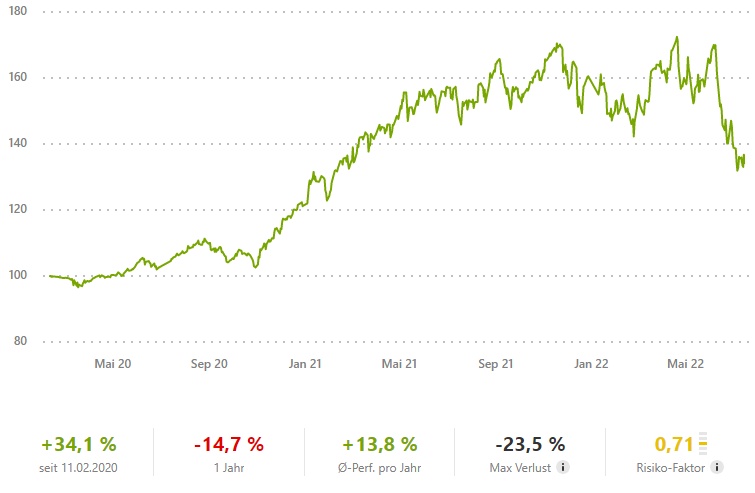Hi everyone, I found 𝐳𝐰𝐞𝐢 𝐢𝐧𝐭𝐞𝐫𝐞𝐬𝐬𝐚𝐧𝐭𝐞 𝐔𝐧𝐭𝐞𝐫𝐧𝐞𝐡𝐦𝐞𝐧 rebalancing again this month - I'm happy to share my findings with you here:
The average return per year - for the 𝐕𝐚𝐥𝐮𝐞 & 𝐌𝐨𝐦𝐞𝐧𝐭𝐮𝐦 𝐰𝐞𝐥𝐭𝐰𝐞𝐢𝐭 portfolio - recovered somewhat in August 2022, rising to +17.1% (from +13.8%). This is encouraging, but in a year like this, this number can change dramatically on an almost daily basis - depending on recession fears, war, and even geopolitical factors such as the conflict between China and Taiwan. Since the start on February 11, 2020, the return is now +50% again.
A 𝐝𝐞𝐭𝐚𝐢𝐥𝐥𝐢𝐞𝐫𝐭𝐞 & ü𝐛𝐞𝐫𝐬𝐢𝐜𝐡𝐭𝐥𝐢𝐜𝐡𝐞 𝐓𝐚𝐛𝐞𝐥𝐥𝐞 of the entire portfolio is available here:
I'd love to put it all in here, but displaying it is a bit tricky. I have nevertheless packed as much as possible for you in here.
But now back to the 𝐚𝐤𝐭𝐮𝐞𝐥𝐥𝐞𝐧 𝐒𝐢𝐭𝐮𝐚𝐭𝐢𝐨𝐧:
It turns out that my confidence seemed justified in the last rebalancing in July. The portfolio seems well positioned for the current economic climate with a high allocation to the commodity sector. This is despite the fact that many issues remain such as inflation concerns, war, and supply chain difficulties.
The rebalancing in August also showed that one has to look closely: Companies that no longer meet the quality criteria must be rigorously weeded out rather than held on to. Because nowhere is it written that you have to make up a loss with the same share. In practice, I notice that both laymen and professionals find it difficult to part with losers in the portfolio. Instead, they often sell winners too early instead of keeping them. Both are detrimental to returns.
As an asset manager, I try to take these 𝐞𝐦𝐨𝐭𝐢𝐨𝐧𝐚𝐥𝐞 𝐊𝐨𝐦𝐩𝐨𝐧𝐞𝐧𝐭𝐞 out of investment decisions. When investing, it is important to be very 𝐬𝐭𝐫𝐮𝐤𝐭𝐮𝐫𝐢𝐞𝐫𝐭 𝐯𝐨𝐫𝐳𝐮𝐠𝐞𝐡𝐞𝐧. This is exactly how I approach the value and momentum strategy: 𝐐𝐮𝐚𝐥𝐢𝐭𝐚𝐭𝐢𝐯 𝐡𝐨𝐜𝐡𝐰𝐞𝐫𝐭𝐢𝐠𝐞 companies with 𝐠ü𝐧𝐬𝐭𝐢𝐠 𝐛𝐞𝐰𝐞𝐫𝐭𝐞𝐭𝐞𝐧 shares and a 𝐡𝐨𝐡𝐞𝐧 𝐌𝐨𝐦𝐞𝐧𝐭𝐮𝐦 are bought. Those shares that no longer meet these criteria are sold.
𝐍𝐞𝐮 in the portfolio are no less than two U.S. companies from the commodities sector: on the one hand, this is 𝐂𝐕𝐑 𝐄𝐧𝐞𝐫𝐠𝐲, which, in addition to processing petroleum, is also active in the production of nitrogen fertilizer and was founded back in 1906. The second company is 𝐏𝐁𝐅 𝐄𝐧𝐞𝐫𝐠𝐲, which specializes in the processing and supply of petroleum products in the United States, Canada, and Mexico.
Both companies are characterized by having a high Piotroski F-Score. That is, they are 𝐬𝐞𝐡𝐫 𝐫𝐞𝐧𝐭𝐚𝐛𝐞𝐥, have a 𝐠𝐞𝐫𝐢𝐧𝐠𝐞 𝐕𝐞𝐫𝐬𝐜𝐡𝐮𝐥𝐝𝐮𝐧𝐠, and are 𝐞𝐟𝐟𝐢𝐳𝐢𝐞𝐧𝐭 𝐢𝐦 𝐊𝐞𝐫𝐧𝐠𝐞𝐬𝐜𝐡ä𝐟𝐭. In addition, they have a very 𝐡𝐨𝐡𝐞𝐬 Adjusted Slope 𝐌𝐨𝐦𝐞𝐧𝐭𝐮𝐦 - meaning the stock price has risen sharply and they are still cheaply valued. Such a combination is not easy to find. Certainly, the high raw material prices help here and it will be seen in the coming year whether this remains so. Unfortunately, it does not currently look like the world situation will change overnight.
I am happy to present the core business of the two newcomers in the portfolio here:
𝐂𝐕𝐑 𝐄𝐧𝐞𝐫𝐠𝐲:
CVR Energy was founded in 1906 and is headquartered in Sugar Land, Texas.
The company operates in the United States of America and specializes in petroleum refining and nitrogen fertilizer manufacturing.
In the Petroleum segment, CVR Energy refines and markets gasoline, diesel fuel, and other refined products. The company owns and operates crude oil refineries in southeast Kansas and Wynnewood, Oklahoma. It primarily serves retailers, railroads, agricultural cooperatives and other refiners/marketers.
The Nitrogen Fertilizer segment owns and operates a nitrogen fertilizer plant in North America. The company sells products primarily to agricultural and industrial customers.
𝐏𝐁𝐅 𝐄𝐧𝐞𝐫𝐠𝐲:
PBF Energy is based in Parsippany, New Jersey and was founded in 2008.
The company is divided into two segments: Refining and Logistics. Through its petroleum processing operations, PBF produces gasoline, low-sulfur diesel, fuel oil, lubricants, asphalt, and other petroleum products, for example. As of December 31, 2021, the company owned six oil refineries and related assets.
The company sells its products primarily in the United States, but also in Canada and Mexico. In addition, its logistics operations provide rail, truck, and marine transportation, as well as pipeline transportation and storage.
𝐀𝐧𝐥𝐚𝐠𝐞𝐬𝐭𝐫𝐚𝐭𝐞𝐠𝐢𝐞:
It has been shown in numerous studies and also in practice that the 𝐊𝐨𝐦𝐛𝐢𝐧𝐚𝐭𝐢𝐨𝐧 𝐯𝐨𝐧 𝐕𝐚𝐥𝐮𝐞 𝐮𝐧𝐝 𝐌𝐨𝐦𝐞𝐧𝐭𝐮𝐦 has outperformed the overall market. This is especially true for a diversified portfolio. I consistently apply these findings: For portfolio construction, a three-step analysis is used for a single-stock strategy to invest in the companies with the best risk-return ratio. The analysis and selection process is as follows:
𝐕𝐚𝐥𝐮𝐞-𝐅𝐚𝐤𝐭𝐨𝐫𝐞𝐧: Finding the 10% companies with the strongest undervaluation using carefully selected value metrics.
𝐐𝐮𝐚𝐥𝐢𝐭ä𝐭𝐬-𝐅𝐚𝐤𝐭𝐨𝐫𝐞𝐧: Filtering the companies with very good fundamentals.
𝐌𝐨𝐦𝐞𝐧𝐭𝐮𝐦-𝐅𝐚𝐤𝐭𝐨𝐫: Selecting stocks with the highest price momentum.
This procedure was developed following the "𝐓𝐫𝐞𝐧𝐝𝐢𝐧𝐠 𝐕𝐚𝐥𝐮𝐞 𝐒𝐭𝐫𝐚𝐭𝐞𝐠𝐲" by James O'Shaughnessy and was multiplied by the quality factor (𝐏𝐢𝐨𝐭𝐫𝐨𝐬𝐤𝐢 𝐅-𝐒𝐜𝐨𝐫𝐞) and the 𝐀𝐝𝐣𝐮𝐬𝐭𝐞𝐝 𝐒𝐥𝐨𝐩𝐞 𝐌𝐨𝐦𝐞𝐧𝐭𝐮𝐦 (Andreas Clenow) further refined, in order to smooth out strong price movements due to exceptional situations and to follow the classic 𝐕𝐚𝐥𝐮𝐞 𝐓𝐫𝐚𝐩 𝐞𝐧𝐭𝐠𝐞𝐠𝐞𝐧𝐳𝐮𝐰𝐢𝐫𝐤𝐞𝐧.
The approach involves a predominantly 𝐥𝐚𝐧𝐠𝐟𝐫𝐢𝐬𝐭𝐢𝐠𝐞𝐧 𝐀𝐧𝐥𝐚𝐠𝐞𝐡𝐨𝐫𝐢𝐳𝐨𝐧𝐭 with a 𝐝𝐢𝐯𝐞𝐫𝐬𝐢𝐟𝐢𝐳𝐢𝐞𝐫𝐭𝐞𝐧 𝐖𝐞𝐫𝐭𝐬𝐜𝐡𝐫𝐢𝐟𝐭𝐞𝐧𝐩𝐨𝐫𝐭𝐟𝐨𝐥𝐢𝐨. Monthly rebalancing takes place.


